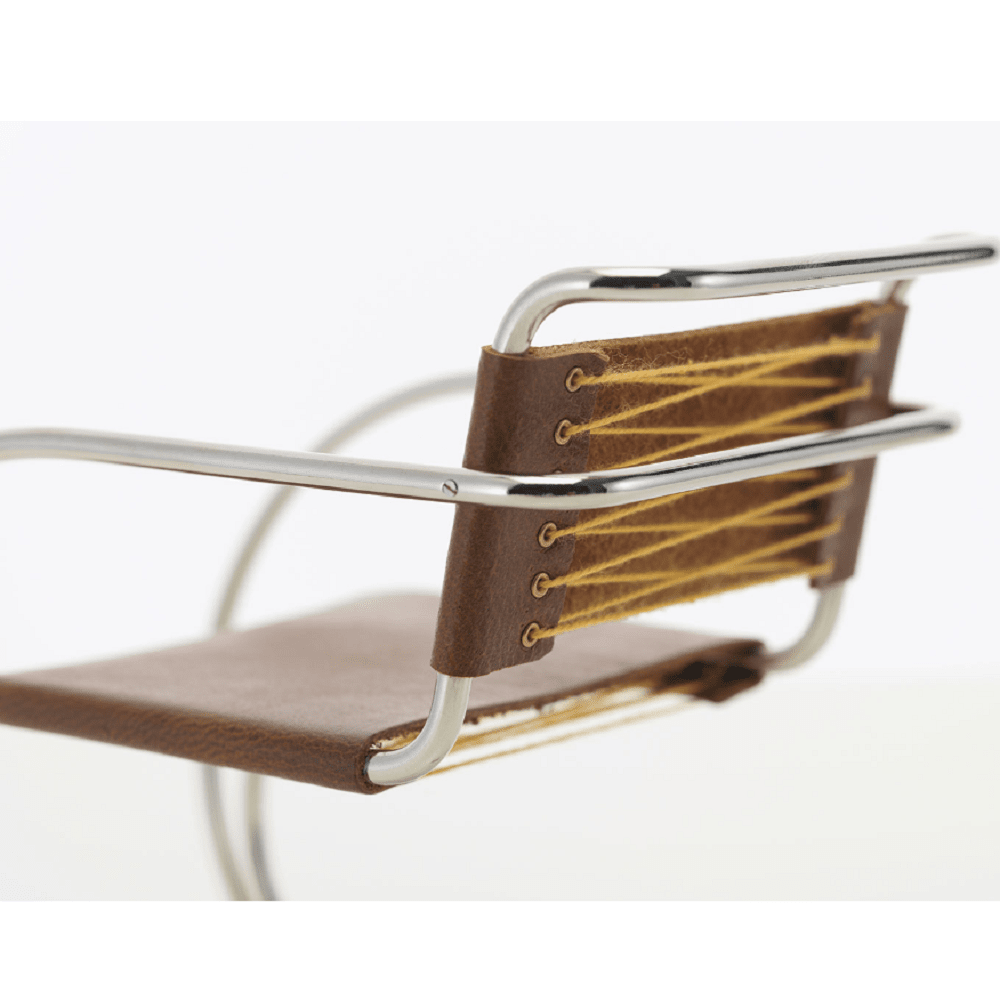800.605.1859 - FREE SHIPPING ON MOST ITEMS OVER $99.00
Accessories
lighting
Designers
- ACHILLE CASTIGLIONI
- ALBERTO MEDA
- ALESSANDRO MENDINI
- ALEXANDER GIRARD
- ALFREDO HABERLI
- ALVAR AALTO
- ANNA CASTELLI FERRIERI
- ANTONIO CITTERIO
- ARNE JACOBSEN
- BARBER & OSGERBY
- CARLO ALESSI
- CARLO MOLLINO
- CHARLES & RAY EAMES
- CHARLOTTE PERRIAND
- EERO SAARINEN
- EILEEN GRAY
- ENZO MARI
- ERNESTO GISMONDI
- ETTORE SOTTSASS
- ACHILLE CASTIGLIONI
- ALBERTO MEDA
- ALESSANDRO MENDINI
- ALEXANDER GIRARD
- ALFREDO HABERLI
- ALVAR AALTO
- ANNA CASTELLI FERRIERI
- ANTONIO CITTERIO
- ARNE JACOBSEN
- BARBER & OSGERBY
- CARLO ALESSI
- CARLO MOLLINO
- CHARLES & RAY EAMES
- CHARLOTTE PERRIAND
- EERO SAARINEN
- EILEEN GRAY
- ENZO MARI
- ERNESTO GISMONDI
- ETTORE SOTTSASS
In-Stock Items
Miniatures MR 20
****USUALLY SHIPS IN 8-10 WEEKS****
Design Mies van der Rohe, 1927
Nickel-plated tubular steel, leather
Made in Germany by Vitra
During the mid-twenties, tubular steel won favor among avant-garde designers as a preferred material for furniture design. The most important designs for tubular steel, now regarded as classics of modern furniture design, were created within the course of just a few years.
During preparations for the Weissenhof exhibition in Stuttgart, Mart Stam developed a new chair type, the tubular steel chair with no back legs. In order to counter the possible instability of the cantilevered frame, Stam reinforced the steel tubing at critical angles, thereby creating a strong, but rigid structure. It was Mies van der Rohe who first discovered the elasticity of steel tubing and utilized it as a structural principle.
Inspired by Stam's idea, he designed the first flexible cantilevered chair in the history of design in 1927. The model was produced both with and without armrests under the names MR 20 and MR 10, respectively. The tubular steel furniture of the 1920s represents a rejection of the conventional, overladen bourgeois interior of the time, filled with massive furniture and decorative trinkets. The transparency and structural clarity of tubular steel furniture embodies a new ideal in architecture and design: interior space flooded with natural light.
Dimensions: H 5.25" x W 3.5" x D 5.75"
Miniatures MR 20
****USUALLY SHIPS IN 8-10 WEEKS****
Design Mies van der Rohe, 1927
Nickel-plated tubular steel, leather
Made in Germany by Vitra
During the mid-twenties, tubular steel won favor among avant-garde designers as a preferred material for furniture design. The most important designs for tubular steel, now regarded as classics of modern furniture design, were created within the course of just a few years.
During preparations for the Weissenhof exhibition in Stuttgart, Mart Stam developed a new chair type, the tubular steel chair with no back legs. In order to counter the possible instability of the cantilevered frame, Stam reinforced the steel tubing at critical angles, thereby creating a strong, but rigid structure. It was Mies van der Rohe who first discovered the elasticity of steel tubing and utilized it as a structural principle.
Inspired by Stam's idea, he designed the first flexible cantilevered chair in the history of design in 1927. The model was produced both with and without armrests under the names MR 20 and MR 10, respectively. The tubular steel furniture of the 1920s represents a rejection of the conventional, overladen bourgeois interior of the time, filled with massive furniture and decorative trinkets. The transparency and structural clarity of tubular steel furniture embodies a new ideal in architecture and design: interior space flooded with natural light.
Dimensions: H 5.25" x W 3.5" x D 5.75"
You may also like
Subscribe
Sign up to get the latest on sales, new releases and more …













